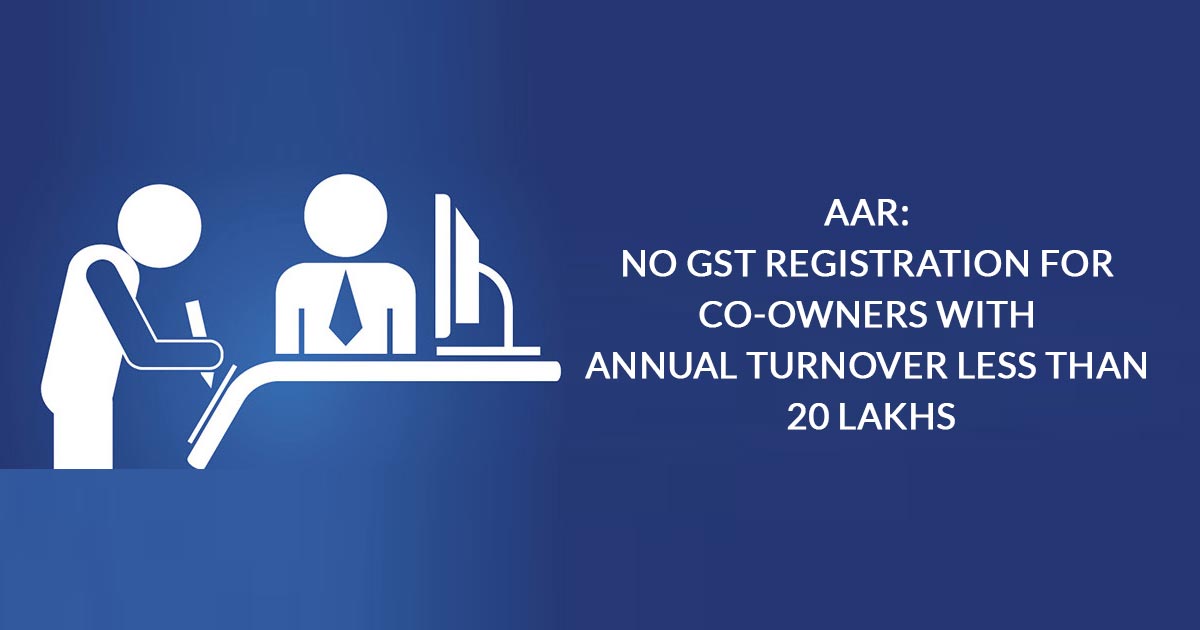The Kerala AAR’s has recently ruled that threshold exemptions will be applicable on the individual earnings of co-owners who are participants in a jointly owned property. Though the gross rent accrues from the property may be large, participants or co-owners can still apply for threshold exemption based on his individual share of the rent alone. Section 22 of the Central Goods and Services Tax (CGST) Act is effective in this regard. However, section 22 would be termed null and void for the particular co-owner if his aggregate turnover exceeds Rs. 20 Lakhs in a financial year.
The Case
AAR Kerala gave the judgment against an appeal filed by a complainant who happens to be a co-owner of a considerably large property. As per the appeal filed to the AAR, There are 14 co-owners of the property including the applicant. Following confusion, over individual threshold eligibility under section 22, the applicant sought a solution from the AAR. As per the applicant, the immovable property is jointly owned by all 14 parties. While the total collective rent from property exceeds Rs 20 Lakh, it is however divided equally among all the 14 co-owners. This reduces the share of each co-owner by a considerable margin. The individual rent is less than the threshold limit. The applicants sought resolution on below conflicting points:
- Renting of immovable property is considered the supply of service under GST. 18% GST is levied on these services under the GST Act.
- Section 22 of the GST exempts a supplier from GST registration if aggregate annual turnover is less than Rs. 20 Lakhs.
The AAR on hearing the appeal noted that the collected rent was equally distributed among all co-owners. The net income of each supplier was less than Rs.20 Lakh. The co-owner collected rent from his own tenants as well as those of the other co-owners. The rent was later distributed by the co-owner to every other co-owner of the property. The fact that rent was collected by only one co-owner and later distributed to all is an administrative decision. All transaction are clear and ascertainable.
Read Also: Yet Again Goods and Services Tax Comes To Haunt Cab Companies
The AAR believes that the as the co-owners individual rent does not cross the threshold limits, the section 22 of the Central Goods and Services Tax (CGST) Act is applicable. Rent is no doubt collected together but is later fairly distributed in proportion with individuals share in the property. The proportionate sharing makes it eligible for threshold exemption benefit.
Key Highlights of the AAR Ruling
- Co-ownership of the property is for administrative, financial, and family reasons.
- Properties are jointly held and rented out as per individual ownership shares.
- Rent is accrued collectively and later divided as per ownership ratio.
- Each fraction of the distributed rent is deposited to the respective co-owner’s bank account.
- Co-owner whose annual receipts do not exceed Rs.20 Lakh is exempt from GST Registration. Even if the collective share exceeds Rs.20 Lakh.
The AAR Ruling says, “By mere joining of hands of two or more persons, a different and distinct legal entity or legal personality does not come into existence unless there is an intention to do so. It is settled law under Section 26 of the IT Act that where the property, consisting of buildings and land appurtenant, is owned by two or more persons and their respective shares are definite and ascertainable, such persons shall not, in respect of such property, be assessed as an association of persons, but the share of each such person in the income from the property is included in his total income”.
